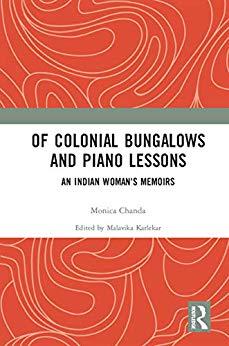I wonder whether one is naturally drawn to memoirs, biographies and autobiographies as one goes older. Certainly, among the reader friends of my generation this is a noticeable trend. At a time when the world is changing more rapidly than it has in the last two generations, this genre often records a time that few remember or understand clearly. Soon, it will recede just as surely as our black and white world has been replaced with the distracting charms of the digital records. I often wonder what primary sources future scholars will be able to mine when they sit down to write in the absence of hand-written notes, diaries and letters.
Monica Chanda’s memoir, edited by her daughter Malavika Karlekar, is a slim book crafted from diary entries made by the author which record only a slice of her lifetime—her childhood spent in sprawling, but isolated, colonial bungalows in the undivided State of Bengal. She records a little over a decade (1913-27) and the world revealed is (like most childhood memories) idyllic, with fond accounts of horse rides across the countryside, leisurely excursions on barges through the mighty mangroves of the Sunderbans and sultry afternoons spent listening to the calls of birds or watching monitor lizards in the garden. It sounds like a lonely (although happy) childhood with no sister while her brothers, either much older or away in boarding school or too small to provide companionship. Occasionally, there is a cousin who comes on a visit or a family wedding.
What fascinated me is Monica’s self-imposed restraint both in recording emotions and events. An alert reader can sense that this must have been a strongly patriarchal household where the father took all the decisions regarding the upbringing, education and future of his family. Monica’s future husband is chosen for her (as was the custom in those days) and as his only daughter, she held a special place in his heart. However, Monica never seems to have felt the need to question why her desire to attend regular school or take the advance lessons in piano that she yearned for were never seriously considered by either of her parents. My attention was particularly drawn to the portrait of Monica’s mother, an oddly remote presence in a memoir of a childhood. The younger two children (Monica and her brother Willie) were taken care of by ayahs and loyal servants and their horse riding overseen by a syce. The mother comes across as a delicate lady either resting and not to be disturbed or supervising the household staff. There is but one occasion when she shows any emotion and that is when a treasured Venetian glass is shattered into pieces as a servant is carrying the tray it was displayed on. I missed accounts of any mother-daughter exchanges and considering that Monica was the only daughter in the family, there seems to be no discernible close bond between the two.

